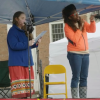Native American nations observed the National Day of Mourning in Plymouth Thursday to call attention to centuries of atrocities committed against Indigenous people and to correct myths common in history texts.
The annual gathering on Cole’s Hill in the coastal Massachusetts town started in 1970 when Wamsutta Frank James went there to deliver a speech drafted for the 350th anniversary celebration of the Pilgrims’ arrival. State officials had rejected his speech for a formal event in Boston as “inflammatory.”
At the 52nd event held on Thursday, sponsored by the United American Indians of New England , the lead speaker was James' granddaughter Kisha James, a member of the Aquinnah Wampanoag and Oglala Lakota tribes.
“When the Pilgrims arrived — on outer Cape Cod, by the way, not on that pebble down the hill — one of the first things the Pilgrims did was to rob Wampanoag grave sites at Corn Hill and steal as much of their winter provisions of corn and beans as they were able to carry,” James said, referring to a hill in Truro. “The writings of the colonists themselves describe these actions taking place.”
James also disputed the year that history texts date the first Thanksgiving dinner shared between the Wampanoag and Pilgrims.
"The first official Thanksgiving did not take place in 1621 when the Pilgrims had a harvest time meal provided largely by the Wampanoag," she said. "Instead, the first Thanksgiving was declared in 1637 by Governor (John) Winthrop of the Massachusetts Bay Colony to celebrate the massacre of over 700 Pequot men, women and children on the banks of the Mystic River in Connecticut."
James and other speakers called for more public attention to Indigenous women missing across the country and the return of national parks to Native Americans. She also endorsed citzenship in five tribes that held slaves for their descendants, known as freedmen, based on treaties signed after the Civil War. Freedmen descendants of the Cherokee have tribal citizenship and the Seminole's have partial rights, but those of the Creek, Choctaw and Chickasaw have been excluded.
This year’s gathering followed the release of historical documents tracing the origins of scalping back to white settlers who began the practice as a bounty system to rid the land of Indigenous people.
After speeches, prayer and drumming, participants marched through the clear, seasonable day to gather at Plymouth Rock.








